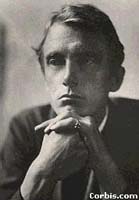Adlestrop Comments
Yes, I remember Adlestrop --
The name, because one afternoon
Of heat the express-train drew up there
Unwontedly. It was late June.
...
Read full text
I am now 83 and have just come across the Poem about Adlestrop: I must visit Adlestrop one day, I love the poem.
I do not know English well, but i like this poet, this poem... His poems remind some poems our poet Андрей Тарковский...
I have loved this poem since I read it in a school anthology in the 1940s. We did not study it - we were lucky enough to be able to explore poetry for ourselves. I knew that hush when the local trains stopped on a quiet country village station, and I knew those villages. Now I have been to Adelstrop. It is much the same, equally quiet, but the station has gone.
Visited Adlestrop today because of Thomas’s poem. On a clear, chill February day the birds song was very evident in that quiet hamlet, although the trains have been silenced. Evocative of a bygone time when Edward Thomas saw the name and penned those memorable words.
A simple poem with no thought of intellectualising it other than face value.persnalising it from internal feelings have made it iconic.I am sure there was no other intent by the author other than simplicity written off the cuff.Never the less evocative and beautiful.
Adletrop. I recently drove through the village and was saddened to see that all that remained of the picture Edward Thomas painted was a sign by a bus stop. But the poem really recalls a spiritual experience. You cannot physicallyl hear all the birds of Oxfordshire and Gloucestershire. But if you suddenly soar into a different consciousness, that is your experience - beyond time, beyond this immediate physical space. It is probably an experience that MANY people have and dismiss it without much thought, but it is a liberation from the petty little ego consciousness into something vaster and beautiful.
I knew this poem from school and later as a serving officer in the first gulf war it hit me with all its embedded meaning, a home far away, untouchable peace and the pain of it not being mine anymore. When and where Thomas wrote this almost narcotic dream of innocence says to me it is unsentimental and more a war poem than i first understood it to be.
From the emptiness of Adlestrop to the song of the solitary blackbird and then to the avian cacophony of Oxfordshire and Gloucestershire - a beautiful poem like the mist in that afternoon.
Did just the same ad Marlene. I wanted absolutely to read the whole poem after its evoked in Sweet Tooth p.178. I've know some of the other War Poets and love everything by Wilfred Owen. Thanks to Ian McEwan, I'll discover Edward Thomas.
I regret the many years I did not know this poet and thanks to Ian McEwan's mention of him and this poem in particular, in his latest novel Sweet Tooth, I can add him to my favourites.
The unwonted stop by Thomas's train at Addlestrop took place in June 1914, before the start of the war. He wrote the poem much later, shortly before being killed at the Battle of Arras in 1917. Prosaically, the platform was empty because no train was due. Poetically, by the time Thomas wrote Adlestrop, he may indeed have been invoking England emptied by the war as well as encapsulating a moment now gone. The scene he conjures must have starkly contrasted with the experience of war.
I read out this poem at my brother's funeral on 5 March 2012 as he loved the area and did railway walks there.
Andrew Hoellering (10/20/2009 1: 37: 00 AM) | Delete this message Yes, a great poet thanks in part to his friendship with Robert Frost, who turned him from prose to poetry and was devastated by his premature death in the first world war. Each time I read the poem I am struck by something new -this time 'for the minute', meaning both at that time and for the joy of the moment. The receding horizons of landscape and bird song in the last verse are, quite simply, unforgettable.
With this re-reading of a verse learnt so many years ago, I was transported back to the same classroom and enthusiastic teacher who first introduced me to Edward Thomas - so yes, thanks to Mr. T. I do remember Adlestrop and still delight in this brilliant unforced picture of early century countryside.....
This is such a fresh, alive reality of the rhythms and proportions of nature providing an unexpected respite for all of us on the hissing express; a totally unforced radiance of words. We need Edward Thomas more than ever for our sesquiquattuordecimcentennial. What a thrill to discover a great poet!

I think some of the Willows are still there by what is now a car park